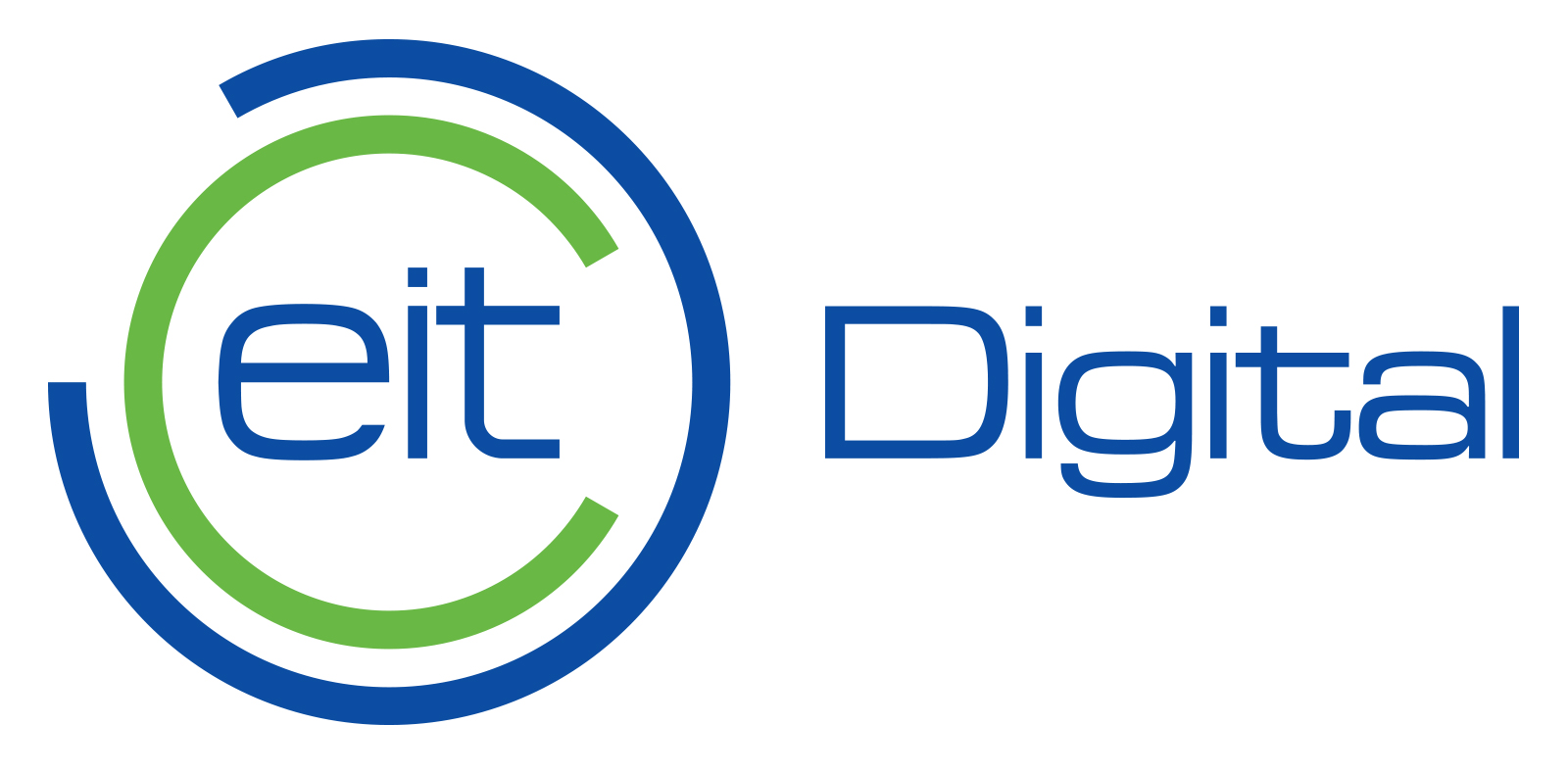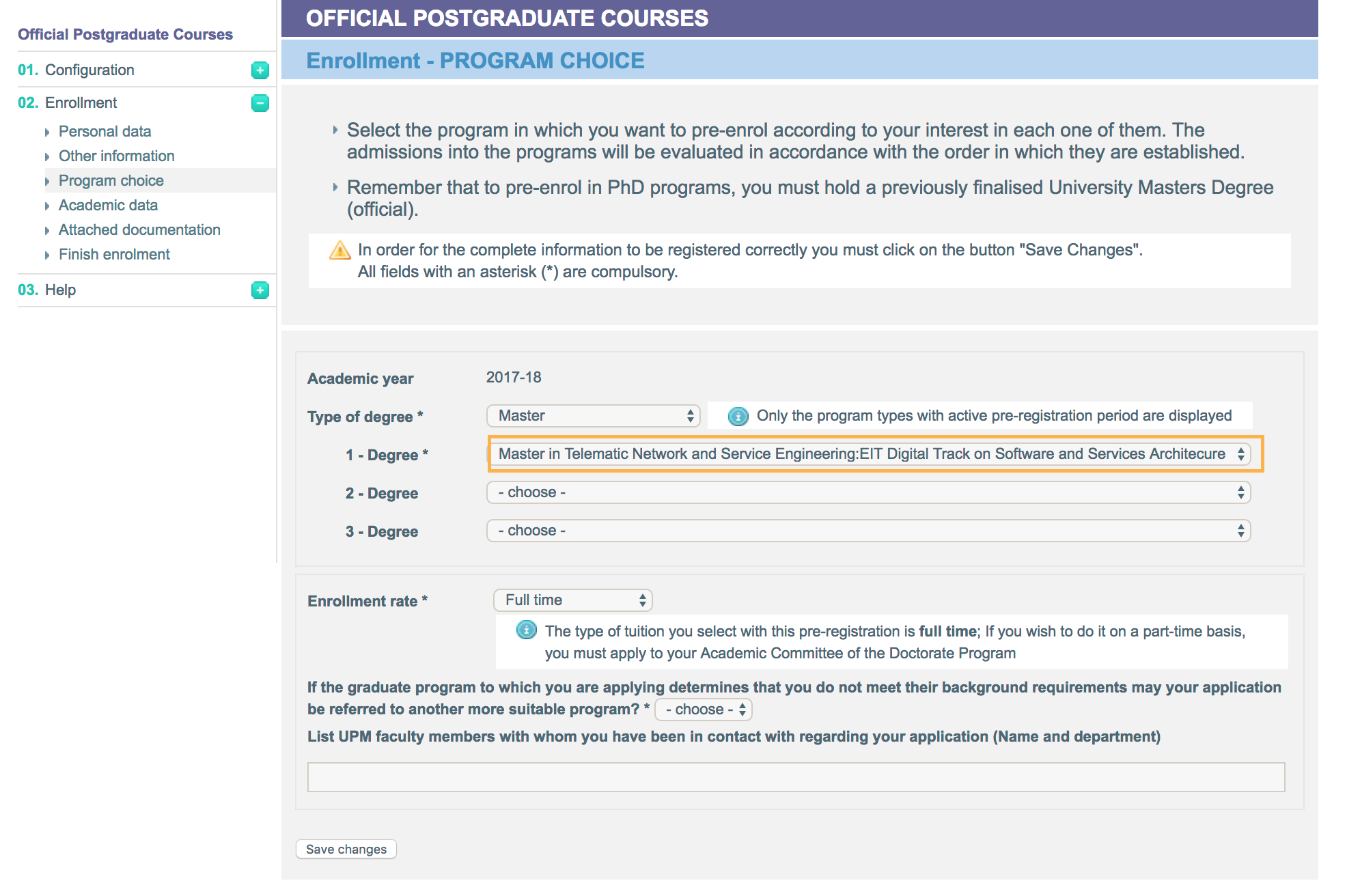

 Curso 2018 - 2019
Curso 2018 - 2019Máster Universitario en Ingeniería de Redes y Servicios Telemáticos de la UPM
ETS de Ingenieros de Telecomunicación - Universidad Politécnica de Madrid
Master in ICT Innovation: Software and Services in the Cloud
Master in ICT Innovation
The Master School is a two-year masters programme with eight technical Majors and a Minor in Innovation & Entrepreneurship. 20 European top universities, renowned researchers and leading businesses are in partnership with EIT Digital to provide cutting-edge ICT excellence in combination with innovation and entrepreneurship training, leading to a double degree and an EIT-labeled Certificate.
Software and Service Architectures (SSA)
The programme in Software and Service Architectures aims to educate the next generation of service designers and software architects capable of designing and engineering novel software systems to: (i) Drive digitalization of businesses, (ii) Create new businesses based on software intensive services, (iii) Be responsible for the elicitation and definition of what software products and services IT companies should create in order to be successful; (iv) Be responsible for the processes and methods for the effective development of modern software systems. (Visit at SSA)
The programme is a double degree programme with studies at a university in one country the first year (entry) and studies at a university in another country the second year (exit). The programme has an integrated technical content (Technical major) and business content (Innovation & Entrepreneurship – I&E minor). The I&E minor is shared between all EIT Master's programmes (link). An integral part of the second year is a Final Degree Project (30 ECTS, including Master's Thesis).The structure and content of the technical major is given below.
Specialization: Software and Services in the Cloud
Associated to this specialization, the general degree and legal framework for the Universidad Politécnica de Madrid, partner at EIT Digital, is the Master on Telematic Services and Network Engineering. It is an official Master according to the Royal Decree 1393/2007, Ministry of Education. The official length of programme is 60 credits ECTS, equivalent to a full-time equivalent for a one academic year (from september to june).
This specialization (exit/minor - 2nd year) focusses on the development of software and services in the cloud. Computing in the cloud enables ubiquitous, on-demand access to a shared pool of scalable and elastic computing and storage resources. It supports a paradigm shift from local to network-centric computing and content.
The specialisation aims at providing the technological and practical background for enabling the students to develop software and services running on top of cloud platforms. It offers courses on the design, development, and deployment of the components of the platform, including configuration aspects, security, audio/video streaming, big data, etc.
The specialisation is offered by experienced teaching faculty, with large experience on teaching and research and on software and network-centric services development, computer networks, data centres, security, and software engineering.
The overall structure of the specialization is shown below.

The Module 1 is composed by four courses on technical cores:
-
Applications and deployments in the cloud (4,5 credits)
The course covers Cloud technologies, including concepts, technique, algorithms and platforms. Focus is in the development cloud services and their deployment. The course deals with the concepts and algorithms for developing distributed applications, with suitable properties such as consistency, fault tolerance or availability. The deployment will be based on lightweight containers (Dockers) and private clouds (Openstack). -
Big Data applications in the cloud (4,5 credits)
The course covers Big Data technologies including concepts, techniques, algorithms and platforms. The first part focusses on big data analytics, machine learning concepts and methods, SQL and NoSQL data bases, cloud and cluster management and orchestrators. The second part of the course includes practical deployments of use cases using technological frameworks based on Python, pandas, scikit-learn, functional programing in Scala or Spark-Scala. -
Audio/video streaming cloud applications (4,5 credits)
The course covers audio/video streaming applications. Live streaming, on-demand streaming, and other variants are introduced and compared. Architectures, technologies, and protocols used for streaming applications are presented, including IPTV and over-the-top architectures, DASH, RTSP, HTML5, and CDNs. Several study cases of audio and video streaming services are reviewed to illustrate the concepts presented during the course. -
Security, Privacy and Service Design (4,5 credits)
The course covers the security scope of the Cloud environment and includes two main parts. The first part deals with the security of Cloud Infrastructure and Services, identifying the security requirements and explaining the design and components of a Security Operation Center (SOC). The second part includes the security and privacy of Information in the cloud, analyzing the methods, techniques and tools for privacy management and anonymity.
The topics on the specialization (module 2) amis at letting the students to develop an assignment related with a concrete mini-project. Some samples of these activities include:
Intelligence for Data Mining
Microservice Architectures
Cloud Networking
SCRUM based Cloud Application Design
Agile process models for software development. Methodologies and tool support
Event Driven Architecture. State of the Art, applications and tools
Functional Reactive programming
The course will provide a set of assignments for the electing the Master's Thesis. The following list includes a set of works done by students in previous years. The set of available assignments is updated and improved during each course, such as:
Design and advanced deployment of Big Data Services
Collaboration services using microservers and reactive programming
Services for smart-cities
Multimedia distribution services, based on Software Defined Networks
Deployment of Sparc Scala over Dockers for Big Data
Recommenders based on Big Data Graph Data Bases
Sparc Streaming over real time data sources in Smart Cities
Design and configuration of a Security Infrastructure for a standard organization
Software Defined Networks scenario for OpenStack
Real-time integration and processing of business events in enterprise software architectures
A learning methodology and framework for agile software development methods
Admission
Students should apply for pre-enrolment. In this process, it is required to provide some documents, such as, a degree certificate to your university, CV, or passport. These are similar to those provided to the admission to EIT Digital, as this University requires them. It is not required to perform an evalutation, as students have already been admitted in the EIT Digital.
Admission is a compulsory formality prior to being able to take a masters degree. Admission to a Masters program is only necessary for the first year. Enrolment can be made by filling out the Web pre-enrolment form (HELIOS).
Some guidelines for the adimission include:
The first time in the admission web, you have to register for getting the user name and password
After entering, you will find the page shown below. At the left column, you can find the "Enrolment" link for showing the optional. Then, you can navagate for providing the required information.
It is important to select the appropriate Master. The correct name is "Master in Telematic Network and Sevices Engineering: EIT Digital Track on Software and Services Architecture". You can find the correct degree that you have to select.
Finally, make sure that you select the "Finish enrollment". Otherwise, the process is finished.
Letter acceptances will be generated after the enrollment process.
